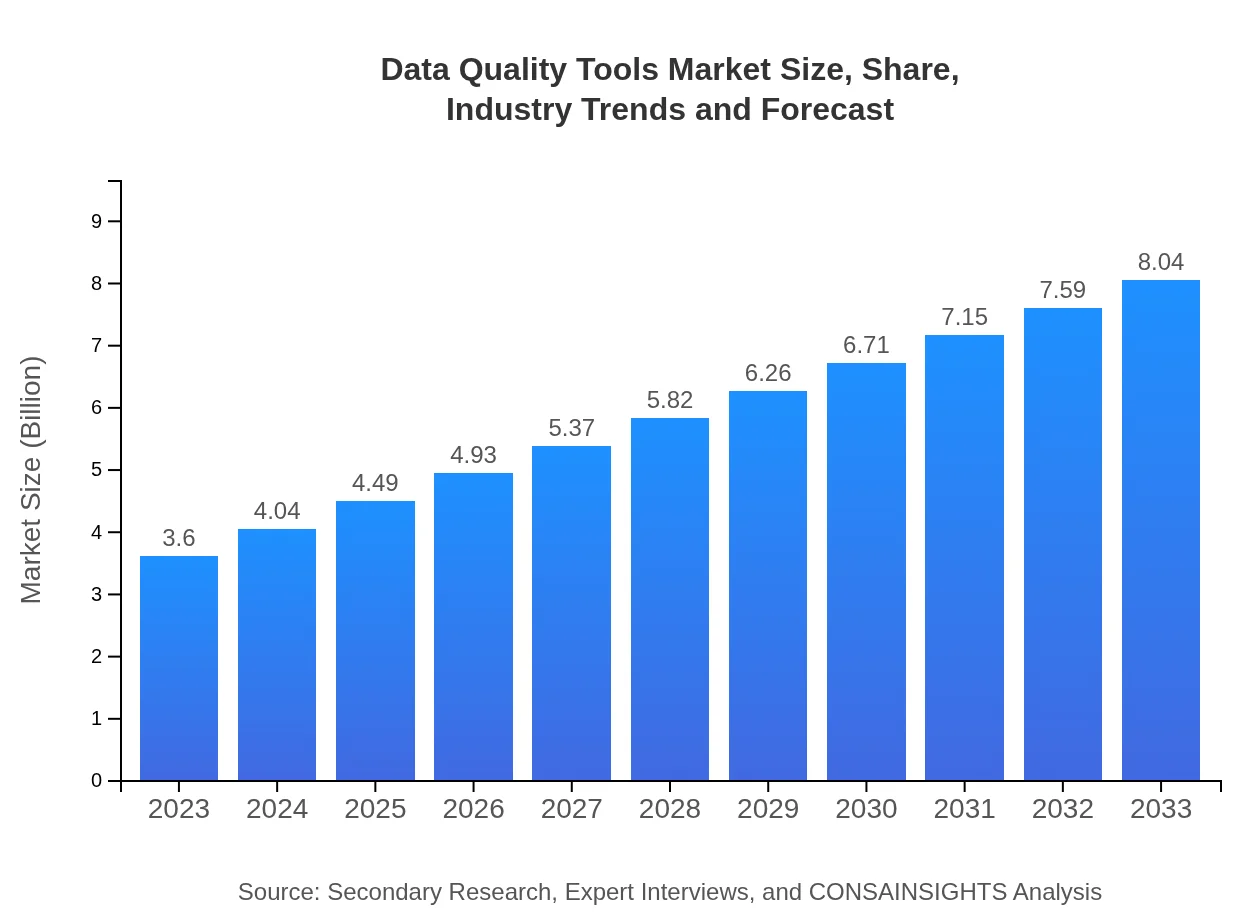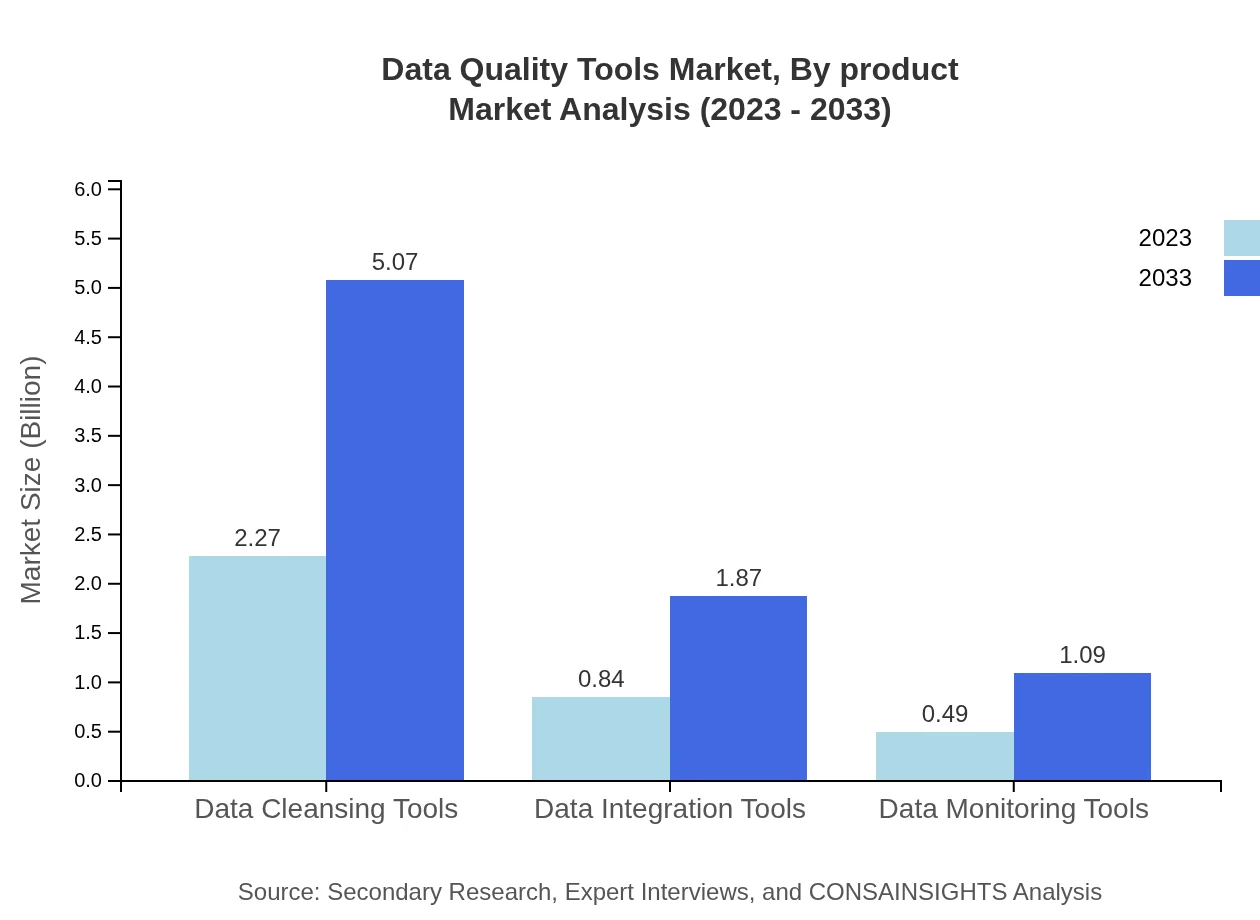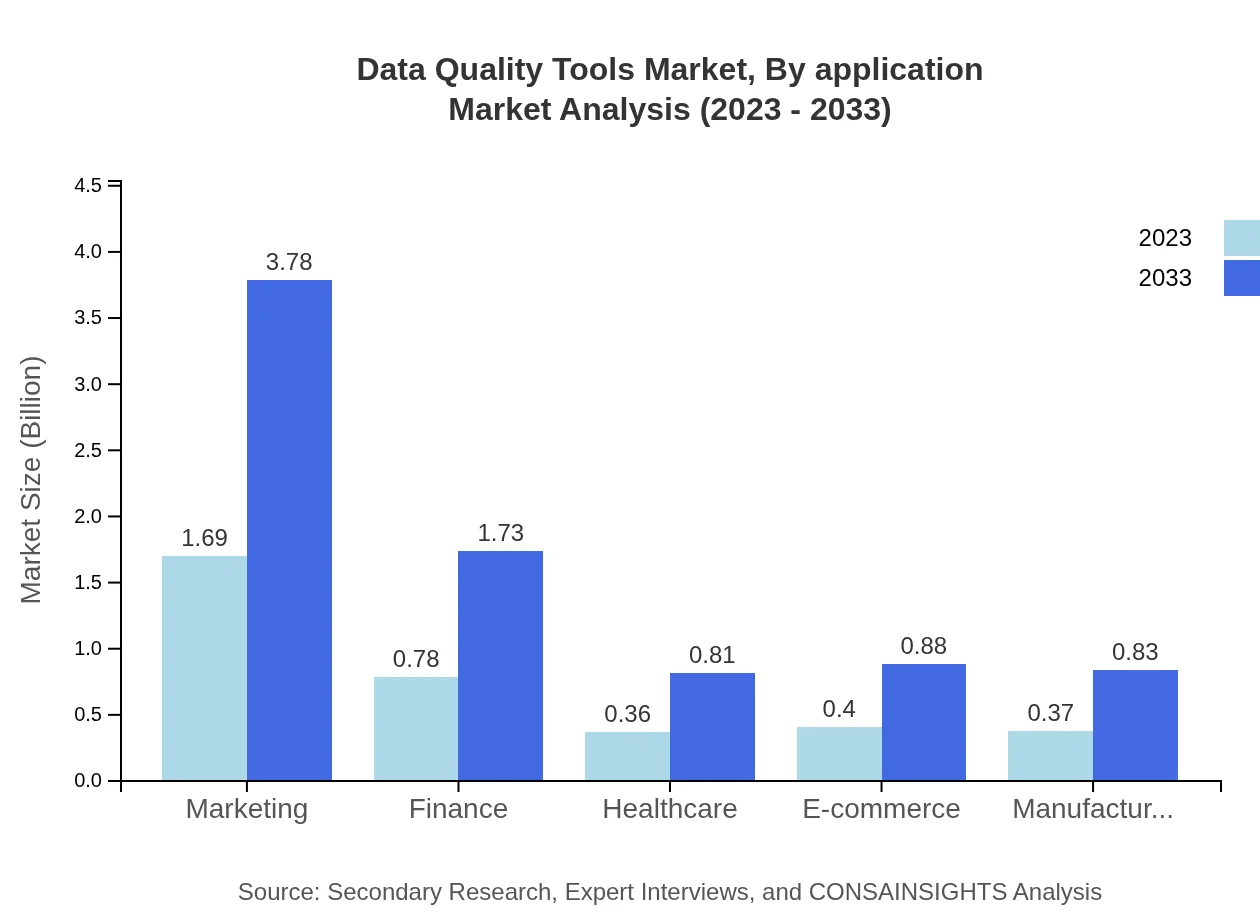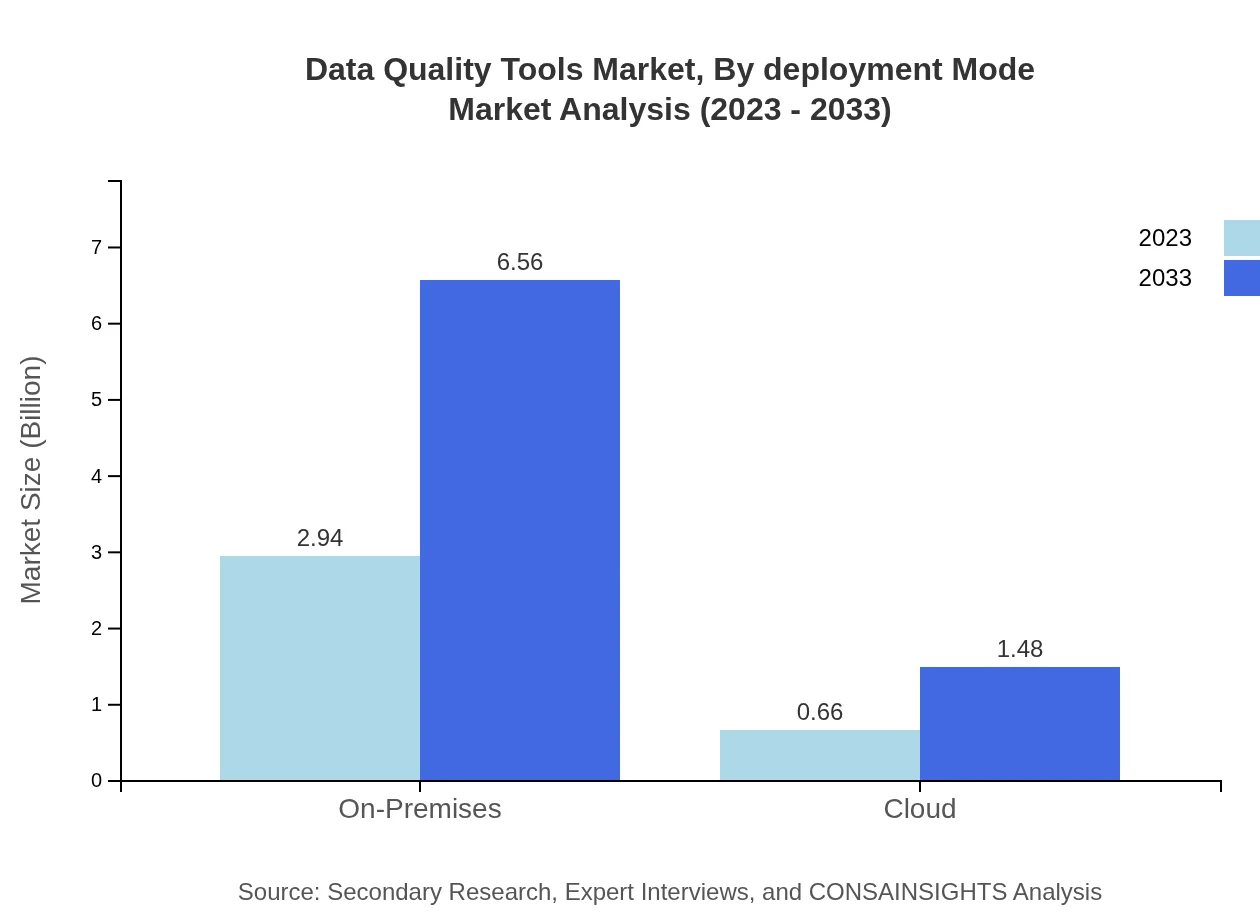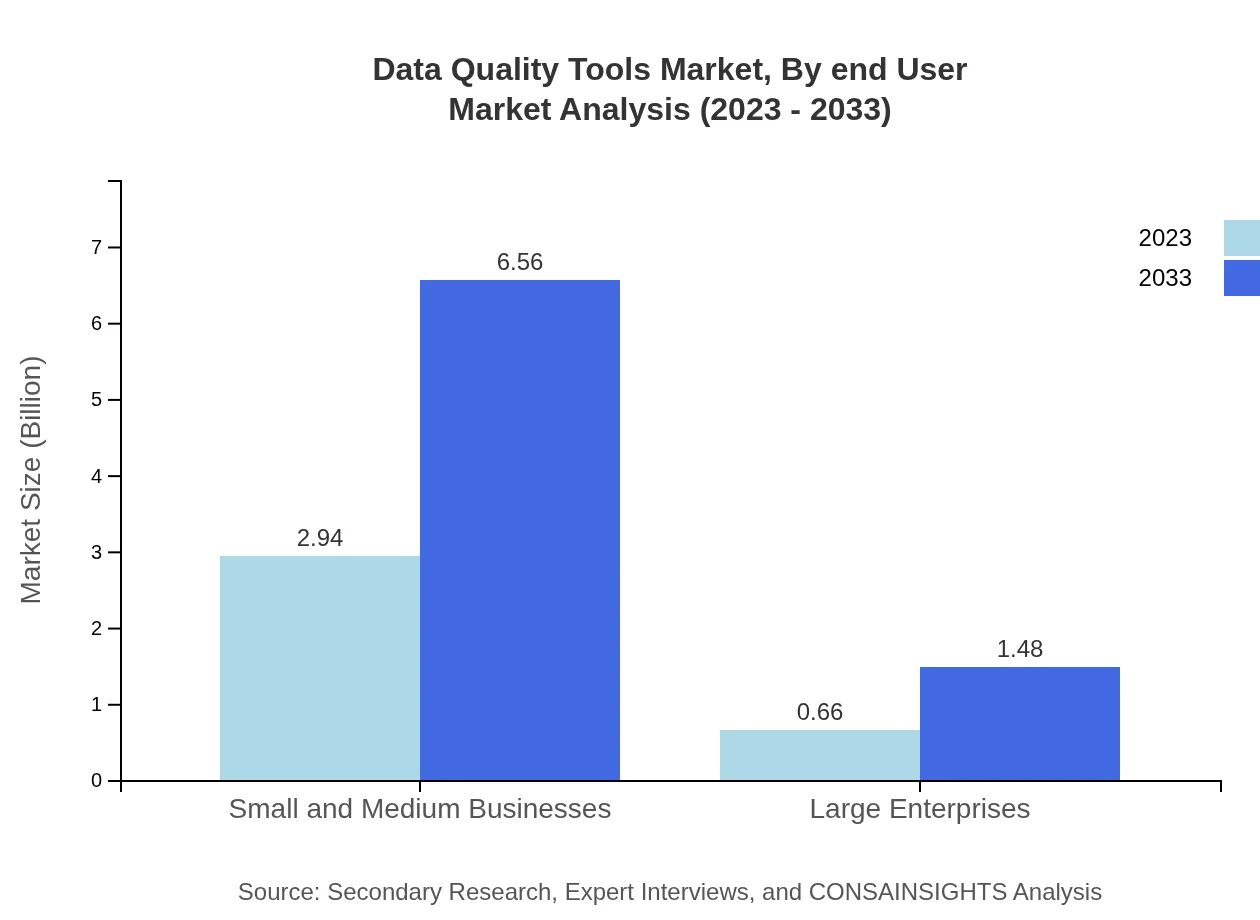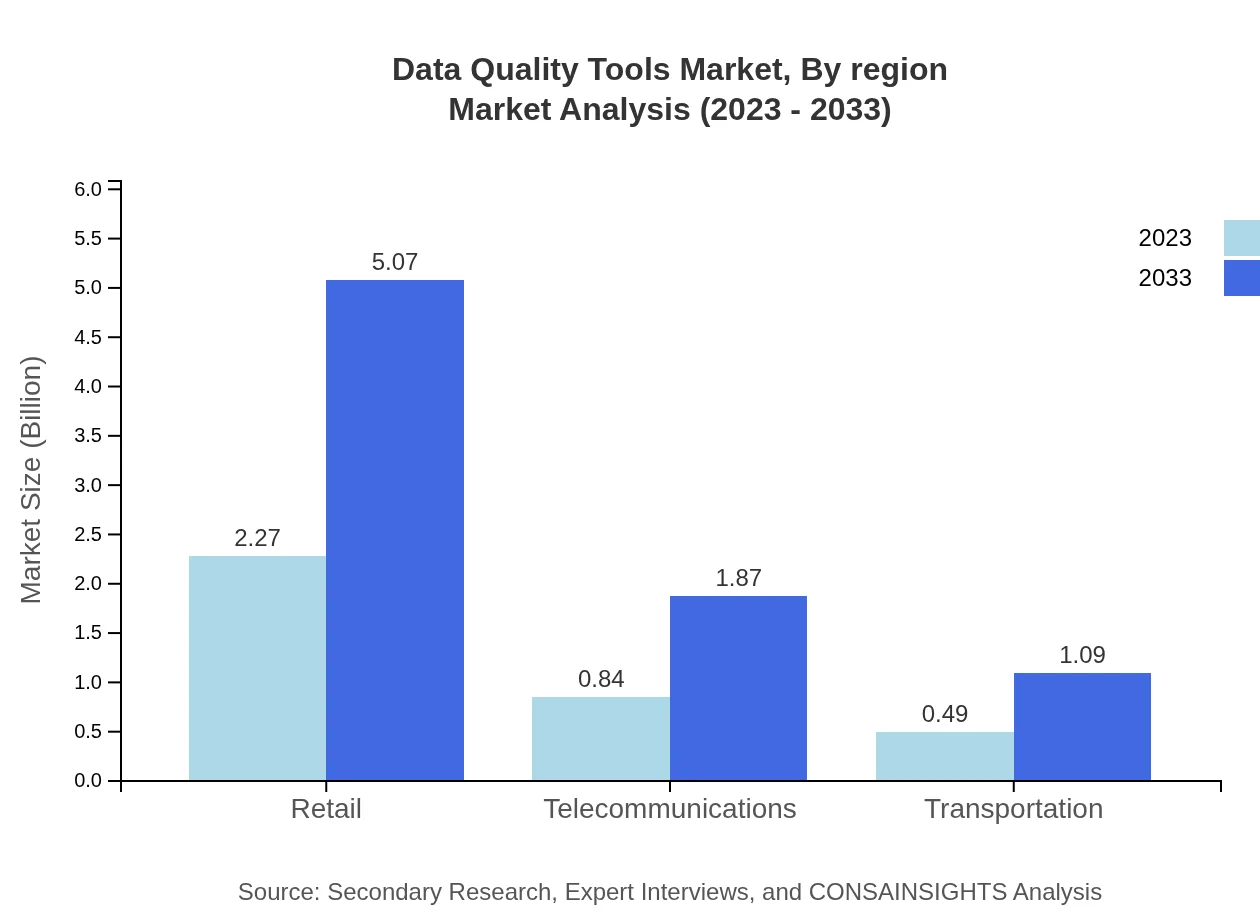Data Quality Tools Market Report
Published Date: 31 January 2026 | Report Code: data-quality-tools
Data Quality Tools Market Size, Share, Industry Trends and Forecast to 2033
This report provides an in-depth analysis of the Data Quality Tools market from 2023 to 2033, highlighting market size, growth trends, segmentation, and insights into emerging technologies and leading companies within the industry.
| Metric | Value |
|---|---|
| Study Period | 2023 - 2033 |
| 2023 Market Size | $3.60 Billion |
| CAGR (2023-2033) | 8.1% |
| 2033 Market Size | $8.04 Billion |
| Top Companies | Informatica, Talend, IBM, SAS, SAP |
| Last Modified Date | 31 January 2026 |
Data Quality Tools Market Overview
Customize Data Quality Tools Market Report market research report
- ✔ Get in-depth analysis of Data Quality Tools market size, growth, and forecasts.
- ✔ Understand Data Quality Tools's regional dynamics and industry-specific trends.
- ✔ Identify potential applications, end-user demand, and growth segments in Data Quality Tools
What is the Market Size & CAGR of Data Quality Tools market in 2023 & 2033?
Data Quality Tools Industry Analysis
Data Quality Tools Market Segmentation and Scope
Tell us your focus area and get a customized research report.
Data Quality Tools Market Analysis Report by Region
Europe Data Quality Tools Market Report:
Europe is anticipated to grow from $1.14 billion in 2023 to $2.53 billion by 2033. Increased focus on data governance and privacy regulations such as GDPR drives organizations to invest in data quality tools.Asia Pacific Data Quality Tools Market Report:
In the Asia Pacific region, the market size is projected to grow from $0.70 billion in 2023 to $1.56 billion by 2033, reflecting significant digital transformation efforts in countries like China and India. This growth is supported by an expanding corporate sector increasingly reliant on quality data-driven insights.North America Data Quality Tools Market Report:
North America, leading the global market, is projected to witness a rise from $1.22 billion in 2023 to $2.73 billion by 2033. The region's strong emphasis on technological innovation and regulatory compliance fuels the demand for effective data quality solutions.South America Data Quality Tools Market Report:
The South American market for Data Quality Tools is expected to increase from $0.25 billion in 2023 to $0.55 billion in 2033. Growing internet penetration and local partnerships with global software suppliers are key factors driving this growth.Middle East & Africa Data Quality Tools Market Report:
The Middle East and Africa are expected to grow from $0.29 billion in 2023 to $0.66 billion by 2033. Factors such as increasing e-commerce initiatives and investment in smart cities are creating a demand for reliable data management solutions.Tell us your focus area and get a customized research report.
Data Quality Tools Market Analysis By Product
The Data Quality Tools market is segmented into several products including data cleansing tools, data integration tools, and data monitoring tools. Data cleansing tools dominate the market, accounting for approximately 63.1% of the total market share in 2023 and expected to maintain this share through 2033. Data integration tools also show significant growth from $0.84 billion in 2023 to $1.87 billion by 2033, while data monitoring tools see substantial growth driven by rising concerns about data breaches and compliance.
Data Quality Tools Market Analysis By Application
Applications for Data Quality Tools span various industry sectors including marketing, finance, healthcare, and e-commerce. The retail sector leads with a market size of $2.27 billion in 2023 and projected growth to $5.07 billion by 2033, driven by the need to enhance customer experiences through quality data insights. Telecommunications and transportation sectors also exhibit substantial growth, reflecting the increasing reliance on accurate data for operational efficiency.
Data Quality Tools Market Analysis By Deployment Mode
The market can be analyzed by deployment mode with on-premises solutions constituting 81.61% of the market share in 2023. However, cloud-based solutions are increasingly gaining traction, gradually increasing from $0.66 billion in 2023 to $1.48 billion by 2033, as organizations seek flexibility, scalability, and reduced operational costs.
Data Quality Tools Market Analysis By End User
The end-user analysis highlights significant growth, especially among small and medium enterprises (SMEs), which accounted for 81.61% of the market share in 2023. Large enterprises are increasingly recognizing the importance of data quality, yet SMEs dominate due to their nimble nature and adaptability to new technologies.
Data Quality Tools Market Analysis By Region
Each region contributes differently to the Data Quality Tools market, with North America holding the largest share, propelled by compliance requirements and technological adoption. Europe is quickly catching up due to stringent regulations, while Asia Pacific is benefiting from rapid digital transformation, creating diverse opportunities for market players.
Data Quality Tools Market Trends and Future Forecast
Tell us your focus area and get a customized research report.
Global Market Leaders and Top Companies in Data Quality Tools Industry
Informatica:
A leader in data integration and quality solutions, Informatica offers a comprehensive suite of tools designed to ensure data accuracy and integrity for enterprises across various industries.Talend:
Known for its open-source data integration solutions, Talend provides robust data quality management tools that help organizations improve data governance and agility.IBM:
IBM's data quality tools leverage advanced AI and machine learning capabilities to enhance data accuracy and streamline data management processes.SAS:
SAS provides powerful analytics and data quality solutions, enabling organizations to meet compliance and operational efficiency requirements through insightful data management.SAP:
SAP’s data quality tools integrate seamlessly with its ERP solutions, helping businesses maintain high data quality standards for better decision-making.We're grateful to work with incredible clients.









FAQs
What is the market size of data Quality Tools?
The global data quality tools market is valued at approximately $3.6 billion in 2023, with a forecasted CAGR of 8.1%. By 2033, the market is expected to grow significantly, reflecting increasing demand for data management solutions.
What are the key market players or companies in this data Quality Tools industry?
Key players in the data quality tools industry include established companies such as IBM, SAP, SAS Institute, Informatica, and Talend. These organizations provide innovative tools and solutions, contributing to the overall growth and evolution of the market.
What are the primary factors driving the growth in the data Quality Tools industry?
The growth in the data-quality-tools industry is primarily driven by the increasing volume of data generated across sectors, the need for accurate data to enhance decision-making, and compliance requirements in data governance. These factors are compelling organizations to invest more in data quality solutions.
Which region is the fastest Growing in the data Quality Tools?
The fastest-growing region in the data quality tools market is Europe, projected to grow from $1.14 billion in 2023 to $2.53 billion by 2033. Asia Pacific follows closely, expanding significantly from $0.70 billion to $1.56 billion during the same period.
Does ConsaInsights provide customized market report data for the data Quality Tools industry?
Yes, ConsaInsights provides customized market report data for the data quality tools industry, tailored to meet specific business needs. This functionality helps clients access relevant insights that align with their strategic objectives and market focus.
What deliverables can I expect from this data Quality Tools market research project?
Deliverables from this market research project typically include comprehensive reports, detailed market analysis, segment insights, competitor landscapes, and future growth projections, enabling businesses to make informed decisions based on robust data.
What are the market trends of data Quality Tools?
Current market trends in the data quality tools sector include the rising adoption of AI and machine learning for better data management, increased demand for real-time data monitoring, and a shift towards cloud-based solutions, shaping the future landscape of the industry.

